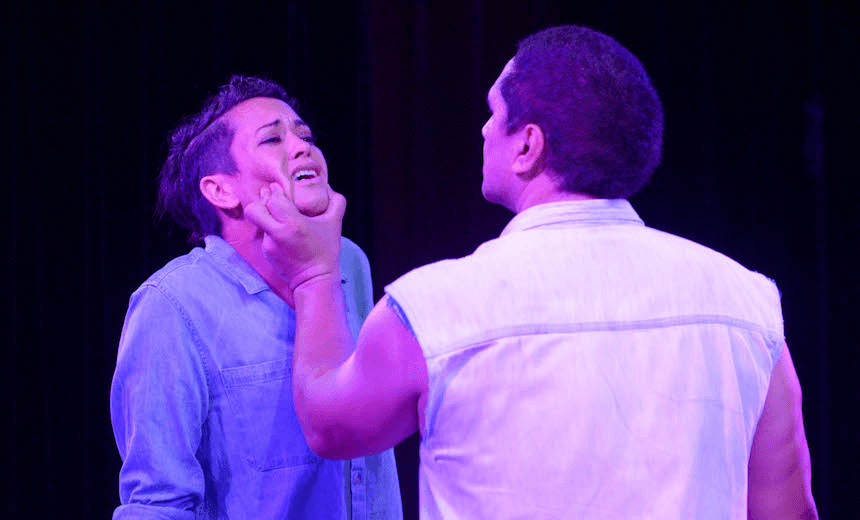In the Arts Festival play Cellfish a drama teacher invites a bunch of prisoners to do a Shakespeare class – and it’s not why you think, says Simon Wilson.
The rain came down and then it stopped and nothing got cancelled. Five shows opened in the Auckland Arts Festival on Wednesday and this one, Cellfish, was a beauty.
What’s the set up? Liberal middle-class woman confronts reality of reactionary male culture and finds art is isn’t as powerful as she thought? Nothing so obvious. Brutal cynical men discover redemption through the Bard? Still way too obvious. The makers of Cellfish aren’t especially interested in the obvious ways – the television ways – to tell this story.
Instead, what they’ve created is a full-blown Shakespearean tragedy of their own. Think Macbeth. With jokes. And te reo. Gloriously, there’s a lot of both, as well what emerges as a brutal, bitter trajectory of pain and despair. It’s an extraordinary achievement, especially given they do it with just two actors, on a very minimalist set, playing multiple roles and rarely even speaking directly to each other.
Ah, but those actors. Miriama McDowell as the drama teacher Lucy finds a dangerous troubled darkness; in character as some of the prisoners she revels in some extremely rubber-faced comedic contortions. Mark Ruka pushes way past his own practised comedic skills to explore the pains of guilt and loss and, eventually, the small, precious comforts of wisdom. It’s hard to look away from either.
The play ends on a brilliant sequence in which culture, race and sex clash with devastating effect. “Come, you spirits that tend on mortal thoughts,” Lucy proclaims, giving herself to a terrible power, “unsex me here and fill me from the crown to the toe, top full of direst cruelty. Make thick my blood, stop up the access and passage to remorse…” Lady Macbeth versus all the strength of tikanga Māori that a man can muster. You come away exhausted and exhilarated.
Also, probably, a little confused. This is a vastly complex piece in the telling, with not just multiple characters but multiple time sequences and some different locations too. It makes the work taut and engrossing, but the mechanics of the storytelling are a little broken. At some moments you realise you’re piecing together the story after the event rather than understanding what happens as it unfolds.
It’s a problem I hope they fix, because when they do, Cellfish will be thrillingly good. It’s already stimulating, hilarious, upsetting and profoundly on point with what it has to say about the intergenerational cycle of violence.
Director Jason Te Kare has pushed his actors hard, you can tell, and has not been afraid to embrace the complexity of the work. That’s so impressive. He and McDowell were the writers, along with Rob Mokaraka, and the task for them now is to clarify, not simplify. Subtle important difference.
Cellfish, part of the Auckland Arts Festival, plays at Q Theatre until Tuesday March 14 and then transfers to Te Oro in Glen Innes, March 16,17. If you haven’t been to the gorgeous new community centre in GI, here’s a really good excuse to go.
The Auckland section is sponsored by Heart of the City, the business association dedicated to the growth of downtown Auckland as a vibrant centre for entertainment, retail, hospitality and business.


